|
|
|
Sort Order |
|
|
|
Items / Page
|
|
|
|
|
|
|
| Srl | Item |
| 1 |
ID:
055708


|
|
|
| 2 |
ID:
103586
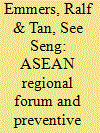

|
|
|
|
|
| Publication |
2011.
|
| Summary/Abstract |
Various reasons purport to explain why the Association of Southeast Asian Nations Regional Forum (ARF) has failed to evolve from confidence building to preventive diplomacy (PD). These include the ARF's large membership, its strict adherence to sovereignty and noninterference principles that contradict any effective implementation of PD, and contrasting strategic perspectives among its participants. Although these factors have certainly hindered security cooperation, none are sufficient conditions by themselves to explain the forum's ambivalence toward PD. The authors argue that these factors do not tell the whole story, not least when they have not stood in the way of experiments in PD by other processes in the Asia-Pacific. The claim here is that the ARF has evolved into a highly inflexible forum, which in turn has led to the formalization of its approach to PD. This has severely inhibited the adoption of a PD agenda and actionable measures under the ARF framework.
|
|
|
|
|
|
|
|
|
|
|
|
|
|
|
|
| 3 |
ID:
047979
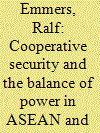

|
|
|
|
|
| Publication |
London, routledgeCurzon, 2003.
|
| Description |
xvi, 197p.
|
| Standard Number |
0415309921
|
|
|
|
|
|
|
|
|
|
|
|
Copies: C:1/I:0,R:0,Q:0
Circulation
| Accession# | Call# | Current Location | Status | Policy | Location |
| 047127 | 327.170959/EMM 047127 | Main | On Shelf | General | |
|
|
|
|
| 4 |
ID:
116369
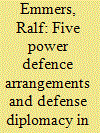

|
|
|
|
|
| Publication |
2012.
|
| Summary/Abstract |
The Five Power Defence Arrangements (FPDA) marked its 40th year of existence on November 1, 2011. What explains the durability of a collection of bilateral consultative arrangements initially conceived in the context of the British military withdrawal from East of Suez? Examining the FPDA as an institutional expression of defense diplomacy in Southeast Asia sheds light on its longevity. The arrangements have successfully operated as a defense diplomacy instrument by fulfilling three core functions. The FPDA has traditionally acted as a psychological deterrent with the fear of an assertive Indonesia in mind. It has performed a confidence-building role in the Singapore-Malaysian relationship. Finally, it has provided Australia, New Zealand, and the United Kingdom with an instrument to be engaged in Southeast Asian security.
|
|
|
|
|
|
|
|
|
|
|
|
|
|
|
|
| 5 |
ID:
096454


|
|
|
|
|
| Publication |
London, Routledge, 2010.
|
| Description |
xii, 188p.
|
| Series |
Routledge security in Asia Pacific series; 11
|
| Standard Number |
9780415469425, hbk
|
|
|
|
|
|
|
|
|
|
|
|
Copies: C:1/I:0,R:0,Q:0
Circulation
| Accession# | Call# | Current Location | Status | Policy | Location |
| 054960 | 341.448095/EMM 054960 | Main | On Shelf | General | |
|
|
|
|
| 6 |
ID:
094190


|
|
|
|
|
| Publication |
London, Routledge, 2010.
|
| Description |
xii, 188p.
|
| Series |
Routledge security in Asia Pacific Series; 11
|
| Standard Number |
9780415469425
|
|
|
|
|
|
|
|
|
|
|
|
Copies: C:1/I:0,R:0,Q:0
Circulation
| Accession# | Call# | Current Location | Status | Policy | Location |
| 054798 | 341.448095/EMM 054798 | Main | On Shelf | General | |
|
|
|
|
| 7 |
ID:
060681


|
|
|
|
|
| Publication |
Mar 2005.
|
| Summary/Abstract |
The article examines the extent to which Vietnam, Laos and Cambodia have gained from their participation in ASEAN. To assess the security and diplomatic benefits of their membership, it identifies three expectations held by the Indochinese states--enhanced international status, improved security and relations vis-à-vis other ASEAN members, and more room for manoeuvre when dealing with non-member states. The study demonstrates, however, that while Vietnam, Laos and Cambodia are less isolated internationally after joining ASEAN, the actual benefits in terms of their relations with the other ASEAN members as well as non-member states have been more ambiguous. With ASEAN in mind, the article concludes by discussing the possible costs and drawbacks of enlargement that can transform any international organisation into a less influential and cohesive institution.
|
|
|
|
|
|
|
|
|
|
|
|
|
|
|
|
| 8 |
ID:
132401


|
|
|
|
|
| Publication |
2014.
|
| Summary/Abstract |
Indonesia is often regarded as the natural leader of the Association of Southeast Asian Nations (ASEAN) in light of its geographical dimensions, large population, strategic position and natural resources. The country has felt entitled to a position of leadership and has generally been recognized by the other ASEAN members as first among equals. While the de facto leadership of Indonesia has traditionally been accepted as conventional wisdom, little attention has been given to the extent to which Jakarta has actually succeeded in exercising leadership in ASEAN and how its attempt to do so has been perceived by the other Southeast Asian states. The paper explores this question by focusing on Indonesia's ability to provide international public goods in the areas of security and economics, engage in conflict management and promote institution building. It argues that the country has sought to establish a stable and autonomous security environment, to conduct conflict meditation efforts in the Cambodian conflict and the South China Sea disputes, and to develop institutional mechanisms to promote security, democracy and human rights among other issues. Still, Indonesia's leadership in ASEAN has been incomplete due to resistance from some members to its preference for an autonomous regional order and in recent years a democratic form of domestic governance. Its leadership has so far also been limited to the political and security spheres, leaving other sectors, like the economy, to others.
|
|
|
|
|
|
|
|
|
|
|
|
|
|
|
|
| 9 |
ID:
062516


|
|
|
|
|
| Publication |
Lanham, Rowman & Littlefield, Publishers, 2005.
|
| Description |
xvi, 306p.
|
| Series |
Asia in world politics
|
| Standard Number |
074252843X
|
|
|
|
|
|
|
|
|
|
|
|
Copies: C:1/I:0,R:0,Q:0
Circulation
| Accession# | Call# | Current Location | Status | Policy | Location |
| 049722 | 327.59/WEA 049722 | Main | On Shelf | General | |
|
|
|
|
| 10 |
ID:
187399
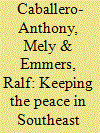

|
|
|
|
|
| Summary/Abstract |
Southeast Asia has gone through a remarkable transformation in recent decades and seen peaceful change since the end of the Cold War era despite great power interference and rivalry and ongoing territorial disputes including the South China Sea conflict. The region has transformed its image from the so-called Balkans of the East in the 1960s and 1970s to an economically competitive and peaceful region today. Despite these accomplishments, the record of the Association of Southeast Asian Nations (ASEAN) in maintaining regional peace and security has also been seriously challenged, particularly at the domestic and transnational level. The paper argues that the Southeast Asian experience of peaceful change calls for a different framework of analysis that goes beyond the traditional International Relations theories which do not provide a compelling answer to whether regional peace has prevailed. It reviews ASEAN’s approaches to managing peace and security in Southeast Asia and brings close attention to domestic and international dynamics. The paper claims that the Southeast Asian states’ approach to positive peace, reflected in the notion of comprehensive security and the building of national and regional resilience, is instructive in understanding peaceful transformations in the region.
|
|
|
|
|
|
|
|
|
|
|
|
|
|
|
|
| 11 |
ID:
074237


|
|
|
|
|
| Publication |
Aldershot, Ashgate Publishing Limited, 2006.
|
| Description |
xi, 250p.
|
| Standard Number |
0754647013
|
|
|
|
|
|
|
|
|
|
|
|
Copies: C:1/I:0,R:0,Q:0
Circulation
| Accession# | Call# | Current Location | Status | Policy | Location |
| 051768 | 327.5/CAB 051768 | Main | On Shelf | General | |
|
|
|
|
| 12 |
ID:
065174
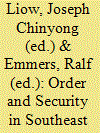

|
|
|
|
|
| Publication |
London, Routledge, 2005.
|
| Description |
xx, 244p.
|
| Series |
Politics in Asia
|
| Standard Number |
0415363659
|
|
|
|
|
|
|
|
|
|
|
|
Copies: C:1/I:0,R:0,Q:0
Circulation
| Accession# | Call# | Current Location | Status | Policy | Location |
| 050434 | 327.59009045/LIO 050434 | Main | On Shelf | General | |
|
|
|
|
| 13 |
ID:
106559


|
|
|
| 14 |
ID:
066262


|
|
|
|
|
| Publication |
2005.
|
| Description |
p645-665
|
|
|
|
|
|
|
|
|
|
|
|
|
|
|
|
| 15 |
ID:
137780


|
|
|
|
|
| Summary/Abstract |
This paper seeks to enrich understandings of middle-power security strategies by examining countries that lack great-power capabilities but still aim to influence the regional security environment. Based on a literature review highlighting the functional and behavioral approaches of middle power diplomacy, we note that these elements could also apply to their regional security strategies. The paper focuses on regional security strategy as a subset of foreign policy and asks why some middle powers appear to go for a regional security strategy that is more functional while others adopt a strategy that is more behavioral. It argues that this divergence derives primarily from differences in resource availability and strategic environment. An analysis of Indonesia, South Korea, Australia and Vietnam highlights how each of these middle powers has adopted a particular regional security strategy, driven by their resource availability and strategic environment.
|
|
|
|
|
|
|
|
|
|
|
|
|
|
|
|
| 16 |
ID:
046241


|
|
|
|
|
| Publication |
Singapore, Institute of Defence and Strategic Studies, 2002.
|
| Description |
ii,25p.
|
| Series |
IDSS working paper;39
|
|
|
|
|
|
|
|
|
|
|
|
Copies: C:1/I:0,R:0,Q:0
Circulation
| Accession# | Call# | Current Location | Status | Policy | Location |
| 046161 | 364.106/EMM 046161 | Main | On Shelf | General | |
|
|
|
|
| 17 |
ID:
095482
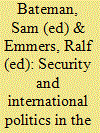

|
|
|
|
|
| Publication |
London, Routledge, 2009.
|
| Description |
xv, 252p.
|
| Standard Number |
9780415469432, hbk
|
|
|
|
|
|
|
|
|
|
|
|
Copies: C:1/I:0,R:0,Q:0
Circulation
| Accession# | Call# | Current Location | Status | Policy | Location |
| 054936 | 355.033016472/BAT 054936 | Main | On Shelf | General | |
|
|
|
|
| 18 |
ID:
179303
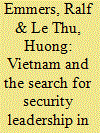

|
|
|
|
|
| Summary/Abstract |
Indonesia has traditionally been viewed as a de facto leader of the Association of Southeast Asian Nations (ASEAN) and the regional body remains the cornerstone of Indonesian foreign policy. The paper addresses the question of whether other member states have become influential actors or even sectoral leaders in their own right by playing a direct role in a particular aspect of ASEAN affairs. This question is addressed by examining the regional policies of Vietnam, a country that has been mostly neglected in the existing ASEAN literature despite its strategic weight. The paper focuses on the evolving role of Vietnam in ASEAN and highlights its diplomatic initiatives, as well as various conditions to evaluate its potential to take up a leading security role in the regional body in the years to come.
|
|
|
|
|
|
|
|
|
|
|
|
|
|
|
|
| 19 |
ID:
155820


|
|
|
|
|
| Summary/Abstract |
Inter-state preventive diplomacy (PD) has mostly been regarded as successful in Southeast Asia as evidenced by the absence of inter-state armed conflict. This success has generally been credited to the Association of Southeast Asian Nations. Yet, in terms of addressing specific crises, the paper argues that three factors are critical to the success of inter-state PD in Southeast Asia: the level of great power interest in particular disputes, the perceived legitimacy of the PD actor, and the nature of the agreement being sought. Great power interference complicates strategic calculations and is therefore likely to make it harder for PD attempts to succeed. Reversely, the critical involvement of the United Nations as a PD-doer and negotiator helps de-escalate violence in interstate disputes in Southeast Asia. The paper applies these factors to understand why the East Timor and the Preah Vihear Temple cases were successful exercises of PD while PD, in regard to the South China Sea dialogue, has so far only produced limited results.
|
|
|
|
|
|
|
|
|
|
|
|
|
|
|
|
|
|
|
|
|